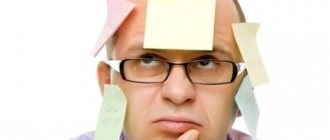- What is senile sclerosis
- Poor memory and failures in older people: manifestations and treatment
- Types of failures
- Types of amnesia
- Characteristic symptoms
- How to treat memory loss and deterioration in older people
- Prevention
Aging cannot be reversed; it is a phenomenon that every person will have to go through. It is important to know in advance what memory loss is in older people, what this disease is called and, most importantly, how to treat it. It is easier to cope with any complexity when everything is known about it. There are various remedies that will help restore mental clarity and normal brain activity. It is impossible to completely prevent change, but it is quite possible to slow down the process.
What is attention from a psychological point of view?
Attention is a concept in cognitive psychology that represents the extent to which we process specific information that our brain receives from the environment.
Thanks to attentiveness, the subject’s successful orientation in the surrounding space is ensured, and it also ensures a complete and clear reflection in the psyche. The object of attention falls into the center of our consciousness, other elements are perceived weakly, not clearly, but at the same time the direction of our attention can change.
There are several types of attention:
- Involuntary type . While working with this type of attention, a person does not make any effort of will to concentrate, he does not even set a goal for himself.
- Arbitrary type . During this type, a person makes an effort of will to focus on a specific object.
- Postarbitrary type . During this type of attention, a decrease in volitional efforts is characteristic, but the goal of being attentive remains.
What is absent-mindedness
First of all, absent-mindedness is a state of inattention, constant forgetfulness, which constantly accompanies a person. It is worth remembering that a person is not born with absent-mindedness, he acquires it throughout his life.
The presence of this disorder in everyday life can lead to various problems, and sometimes quite serious ones. Communication with such people is quite troublesome; they cannot build normal relationships and have a very difficult time at work. Therefore, this condition must be treated so that it does not lead to more serious consequences.
Types of amnesia
There are several of them, but only a doctor can determine the specific variety:
- Regressive or short-term. Sometimes memories fade and reappear, but some may be gone forever.
- Progressive. Usually, recent events disappear first, then what happened before is gradually forgotten. It is impossible to assimilate new data. The most enduring fragments emerge from the past, usually from youth.
- Stationary. Most often, it is an irreversible process when pictures from the past are erased from life forever and are practically not restored.
- Fixation. With it, people become absolutely helpless - they are unable to remember anything that happens. They cannot answer whether the gas in the kitchen was turned off or the door was locked. It is dangerous for them to live on their own.
- Pseudo-reminiscence. A severe form, when instead of lost memories a person unconsciously invents new ones, distorts facts to fill in the gaps.
Sometimes there is nothing to worry about, but in other cases only a good doctor can help.
Types of violation
Distracted attention can be of different types:
- functional type;
- poetic look;
- minimal type.
Functional attention disorder
This type of inattention can occur in almost any person as a result of a monotonous and monotonous work process.
This type of malfunction can occur due to problems with sleep, constant headaches, and also if a person has any illnesses.
Minimal distraction
Minimal inattention and forgetfulness is caused by the inability to focus one’s attention on important objects due to deep immersion in one’s personal problems.
This type of disorder occurs due to the fact that a person cannot escape from internal experiences. Personal worries distract him from everything he does.
Poetic nature flies high...
With this disorder of attention, a person is constantly in a state of daydreaming and fantasies. This species has no age restrictions. It applies mainly to people who have a creative character; it is normal for them to be constantly thoughtful, searching, and comprehending.
general characteristics
The basis of absent-mindedness is a violation of the ability to concentrate attention on certain actions or objects.
Normally, attention provides direction and concentration of mental activity. These properties are understood as a person’s ability to go deeper into an activity and distract from extraneous signals. The opposite of the state of concentration is absent-mindedness - the inability to maintain concentration on a chosen object: the topic of conversation, physical or mental work. According to the mechanism of attention disorder, several types of absent-mindedness are distinguished. The true one can be felt as drowsiness or dullness, manifested by unclear and vague perceptions, decreased intellectual functions, aimless fixation of gaze into emptiness. Imaginary absent-mindedness occurs when there is intense concentration on one object and the inability to distribute attention to others. For example, a scientist who is constantly thinking about a new theory looks absent-minded.
The student form of absent-mindedness is caused by excessive switchability and mobility of thought processes. This disorder is typical for children and is associated not with a lack of concentration, but with the inability to maintain it for a long time. The causes of senile forgetfulness are poor switching ability and insufficient concentration. Therefore, in a conversation, older people sometimes get “stuck” on one topic: they don’t develop it, talk for a long time about unimportant details, and cannot quickly start a conversation about something else.
Directed, selective and motivational inattention are considered as types of absent-mindedness. When a person deliberately ignores certain thoughts, memories, sensations, we are talking about directed inattention. Thus, a woman who has recently experienced a divorce may seem distracted when discussing the reason for the separation. Habitual inattention - ignoring daily repetitive signals: ticking clocks, barking dogs, snoring. The concept of motivationally caused inattention was introduced by S. Freud. It implies forgetfulness when visiting certain places, meeting certain people by chance.
Varieties of manifestations
Distracted attention syndrome can manifest itself in different ways, namely:
- Insufficient concentration - absent-mindedness. As a result of this disorder, there is a decrease in the ability to remember what is seen or heard. Inherent in people who are highly sensitive to various conditions (fatigue, anxiety, lack of sleep).
- Rigidity is slowness, inhibition, in which there are problems with switching from one topic to another. This condition is observed in patients with epileptic syndrome, hypomania, and hebephrenia.
- Unstable - spasmodic attention . This condition is characterized by frequent jumping from one topic to another, which results in memory problems. Instability of attention often occurs in children who have attention deficit hyperactivity disorder (ADHD), which leads to memory problems and decreased academic performance.
Distraction of attention - is it a disease, answers the psychotherapist:
Lack of sleep
The fact that a sleepless night has a bad effect on your mental and physical state can be noticed after the first time: your mood and ability to concentrate worsen, you feel tired and foggy in your head. Regular lack of sleep leads to stress, anxiety, and hence memory impairment.
In addition, the lack of a full 7-8 hours of sleep leads to a number of chronic diseases: it increases the risk of diabetes, heart disease and hypertension, excess weight, reduces immunity and generally shortens life expectancy.
Oh, I should be absent-minded and inattentive...
Distraction of attention can be caused by various reasons. To begin with, it is worth highlighting factors of a physiological, not pathological type, which provoke inattention, exhaustion, jumps and inertia of attention:
- Against the background of physical and mental fatigue.
- For chronic lack of sleep, insomnia.
- In a profession that requires performing the same monotonous actions or concentrating on the same object. Often, work behind a conveyor belt or behind the wheel causes disturbances in volume and weakening of attention.
- Sometimes people of certain professions, in the course of their work, develop a habit in which they concentrate on the subject of their scientific research, which entails ignoring everything around them; this is the so-called inertia of attention (switchability disorder). At the same time, memory does not suffer, on the contrary, it improves; it’s just that people working in a scientific field or another field discard everything that is not necessary and try to keep their attention on the most important.
- Age-related changes. With age, especially in old people over 70, the functions of concentrating attention weaken and disorder occurs.
- Sometimes strong anxiety prevents you from focusing your attention, which entails a state of absent-mindedness.
Neurological and other disorders
Absent-mindedness, forgetfulness and inattention can occur due to various diseases and disorders in the body:
- during problems with blood supply and nutrition to the brain that are associated with vascular disorders - atherosclerosis, osteochondrosis, dyscirculatory encephalopathy, arterial hypertension, vertebrobasilar insufficiency;
- various tumor disorders, hydrocephalus;
- Alzheimer's disease, vascular dementia;
- various mental problems - depression, schizophrenia, epilepsy;
- the appearance of headaches of various origins - migraine, arterial hypertension, vegetative-vascular dystonia, anemia;
- problems with sleep, insomnia;
- state of hypoxia;
- genetic factors;
- if the body has problems with metabolism - diabetes;
- if the body has a lack of useful components (iron, magnesium) or, on the contrary, an excess (lead).
TOP 20 drugs to improve the brain 2021
| Drug name | Age restrictions | Doctor's prescription | price, rub. | Rating* |
| Phenotropil (editor's choice) | up to 18 years old | not needed | 880 — 1140 | 9,5 |
| Thiocetam | up to 18 years old | needed | 500 — 550 | 9 |
| Nootropil | up to 3 years | needed | 130 — 330 | 8,5 |
| Memoplant | up to 18 years old | not needed | 600 — 1200 | 8 |
| Cavinton | up to 18 years old | needed | 170 — 730 | 8 |
| Aminalon | No | not needed | 120 — 230 | 8 |
| Bilobil | up to 18 years old | not needed | 260 — 1000 | 7,5 |
| Divaza | up to 18 years old | not needed | 260 — 350 | 7,5 |
| Piracetam | No | needed | 30 — 140 | 7,5 |
| Encephabol | No | needed | 650 — 1000 | 7,5 |
| Vitrum memory | No | not needed | 530 — 2200 | 7,5 |
| Undevit | No | not needed | 30 — 90 | 7 |
| Ginkgo biloba | up to 18 years old | not needed | 100 — 2000 | 7 |
| Glycine D3 | No | not needed | 180 — 500 | 7 |
| Picamilon | No | needed | 70 — 170 | 7 |
| Cerebrolysin | No | needed | 660 — 1500 | 7 |
| Glycine | No | not needed | 50 — 200 | 6,5 |
| Intellan | No | not needed | 180 — 230 | 6,5 |
| Noofen | up to 8 years | not needed | 70 — 470 | 6,5 |
| Fezam | up to 5 years | needed | 240 — 360 | 6 |
* The rating was calculated based on a combination of factors: side effects, availability of a prescription from a doctor, cost, reviews
The best drugs to improve brain activity for different age categories
| For children and schoolchildren | For students | For adults | For pensioners and the elderly |
| Glycine | Fenotropil | Nootropil | Glycine D3 |
| Vitrum memory | Nootropil | Thiocetam | Piracetam |
| Piracetam | Piracetam | Memoplant | Undevit |
| Picamilon | Vitrum memory | Fenotropil | Aminalon |
Absent-mindedness and forgetfulness in children are the main signs of ADHD
Often, absent-mindedness and forgetfulness in children and very young people are characterized by an inability to control themselves. A child’s attention depends on many psychological processes that occur in the body. At the very beginning of his journey, he needs motivation and control from his parents.
Confusion and lack of self-control are often one of the main signs of attention deficit hyperactivity disorder (ADHD). If a child has this disorder, then he or she develops absent-mindedness such as “fluttering” attention. The main features of this condition are a low level of concentration and rapid involuntary switching of attention.
Causes and symptoms
Absent-mindedness and forgetfulness in young children can be provoked by seemingly harmless factors and reasons:
- various preservatives, flavorings, and other food additives that are found in large quantities in modern delicacies;
- medications that are derivatives of salicylic acid;
- if there is an increased craving for sweets;
- problems with carbohydrate metabolism;
- the occurrence of allergic reactions to food;
- if there is a lack of necessary chemical components for the child’s body, especially iron and magnesium;
- if there is an increased level of heavy metal - lead in the blood. Its excess can lead to severe pathologies of the central nervous system and mental retardation.
If a child develops ADHD, he or she may exhibit the following symptoms:
- a state of hyperexcitability, restlessness, constant fuss;
- often switches from one activity to another, while not completing the previous task;
- the child cannot concentrate himself on one specific task;
- he has poor memory, jerky movements, absent-mindedness and forgetfulness.
In addition to these symptoms, you should pay attention to other signs:
- the child cannot concentrate on a specific task and is constantly distracted from it;
- often loses or forgets his school supplies, things, toys;
- constantly refuses to perform certain work, during which concentration and perseverance are required;
- problems with academic performance due to the fact that the child cannot complete even simple tasks;
- slowness;
- is in constant daydreaming;
- does not listen to instructions;
- can quickly switch to another task without fully completing the previous one.
Goals and methods of diagnosis
The primary stage of diagnosis for attention disorders and absent-mindedness includes the following examinations:
- Examination by a neurologist . During the examination, the doctor should assess the state of fine motor skills, as well as identify neuralgic symptoms.
- Conducting a survey with filling out a diagnostic card.
- Conducting neuropsychological testing . During this examination, the level of attention, intellectual abilities, performance on a long task and other conditions are assessed.
In addition, instrumental examinations are carried out and laboratory tests are taken:
- biochemical blood test , which determines the level of sugar, trace elements - iron, magnesium and lead, and studies dopamine metabolism;
- genetic tests;
- conducting ultrasound of the blood vessels of the head with Doppler ;
- electroencephalography (EEG, video-EEG) using evoked potentials (EP) methods;
- carrying out magnetic resonance imaging .
Set of measures
Treatment for ADHD and related disorders should be comprehensive and should consist of the following steps:
- behavior correction techniques;
- psychotherapeutic methods;
- neuropsychological correction.
Correcting absent-mindedness in a child can be done with the help of activities that are aimed at improving concentration. During these classes, various puzzles and logical problems are solved. All activities must be clearly distributed throughout the day, and the main time must be allocated for physical activity and rest. However, if this treatment does not work, other types of treatment may be used.
The main medications that help combat absent-mindedness, forgetfulness and inattention in a child are psychostimulants, which should only be taken under the supervision of a doctor:
- Glycine . This remedy increases performance, improves mental activity, and has a beneficial effect on the central nervous system. Take 1 tablet under the tongue per day.
- Piracetam . Improves mental activity. Take 30-50 mg per day.
- Biotredin . Has a positive effect on cognitive functions. Increases alertness and improves memory. The dose of the drug is 2 mcg per 1 kilogram of body weight, taken for 3-10 days.
- Phenibut . Improves blood circulation in the brain, improves mental activity and memory properties. The dosage is up to 250 mg per day.
All drugs have contraindications and side effects, so be sure to read the instructions for use before use.
During physiotherapeutic treatment the following procedures are performed:
- laser therapy, the full course consists of 7-10 procedures, during each of which 3-5 zones of the body are irradiated;
- DMV therapy, it consists of 8-10 procedures;
- inhalation procedures 5-10;
- UV treatment of the nasopharynx, the full course consists of 3-5 procedures;
- a course of magnetic therapy, which consists of 8-10 procedures.
How to develop attentiveness will be useful for both children and adults:
Treatment of memory impairment
Memory impairment can be treated only after the cause of this process has been established. Medicines should be prescribed exclusively by doctors, as a rule, these are some nootropic drugs, such as:
- Glycine;
- Piracetam;
- Bilobil;
- Pantogam;
- Aminalon;
- Gliatilin.
Gliatilin is an original nootropic drug with central action based on choline alfoscerate. It has long established itself as an effective means for restoring long-term and short-term memory processes. The phosphate formula of Gliatilin promotes good absorption of the drug and allows for the fastest delivery of the active substance to the cells of the central nervous system. Gliatilin improves the transmission of nerve impulses between neurons, protects them from damage and normalizes the structure of cell membranes.
The course of treatment with these drugs is quite long, it is always reinforced by taking multivitamin complexes. Sometimes doctors prescribe physiotherapy to patients. In cases of memory loss, the electrophoresis procedure with intranasal administration of glutamic acid (preparations based on it) works effectively. Pedagogical and psychological correction techniques also effectively influence the restoration of memory when it declines - teachers teach patients to remember by training the unaffected functionality of the brain. If the patient is unable to remember words spoken out loud, he is taught to imagine a visual image of what was said, and then memorization becomes real. The complexity and duration of the learning process lies in the fact that it is important not only to teach a person to resort to intact connections and parallels of the brain, but also to bring this process to automaticity.
Best materials of the month
- Coronaviruses: SARS-CoV-2 (COVID-19)
- Antibiotics for the prevention and treatment of COVID-19: how effective are they?
- The most common "office" diseases
- Does vodka kill coronavirus?
- How to stay alive on our roads?
Memory deterioration reduces a person’s social skills and may indicate the development of other pathologies, being a poor prognostic symptom. Neurologists, neuropsychologists, and therapists treat pathologies associated with memory impairment. However, it is important to understand that very often when patients complain of memory impairment, they are actually suffering from deterioration in attention. This state of affairs is typical for schoolchildren and older people. This happens due to the underestimation of everyday information received by a person. Dealing with absent-mindedness and attention problems is difficult because people rarely realize that there is a problem, even if you tell them about it directly. The way out of this situation is to constantly work on your own perception of information - training attention and memory by recording information on paper, recording it in electronic devices, etc.
You can train the functioning of the brain using the American method of Professor Lawrence Katz, which promotes the activation of brain activity, the creation of new associative connections, involving various parts of the brain. The exercises of this technique include several practices. The specialist says that you should try to do your usual work with your eyes closed. Right-handed people are advised to start performing a number of everyday tasks (brushing their teeth, combing their hair, using a wristwatch) with their left hand, and left-handed people - vice versa. It is important to master at least the basics of sign language and Braille (writing and reading for people with visual impairments), and learn how to operate a computer keyboard using all 10 fingers. It is recommended to study any applied type of needlework from scratch in order to develop finger motor skills. By touch it is necessary to train to distinguish coins of different denominations. It is important to constantly learn something new and try to apply it to your own life - learn new languages, read articles on topics you don’t understand, meet different people, travel, discover new places. All these simple exercises perfectly train brain activity, and therefore memory, and therefore will ensure normal self-awareness for a long time.
What should parents of an inattentive child do?
Parents play an important role when their child has problems with attentiveness and perseverance. They must fulfill the following requirements:
- be sure to adapt to your child’s routine and constantly comply with it;
- control that the child feels calm during the day, so that he does not become overtired; it is also not advisable for him to spend a long time in front of the TV or computer screen;
- try to interest the child in some sports games, you can sign him up for the pool, and also go with him constantly for walks in the fresh air;
- It is advisable to avoid visiting places with large crowds of people and not to invite a large number of guests.
A child’s attention must be trained from childhood so that in the future he does not develop a state of restlessness, loss and absent-mindedness.
It is advisable to interest him in various educational games. Even in infancy, you need to show different toys and name them so that he can already focus on them. If suddenly you have already noticed signs of attention disorder in your child, then it is necessary at the initial stage to begin to independently develop attentiveness and determination.
Buy educational games, construction sets, mosaics. The child must develop perseverance, and each lesson must be completed to the end, and to facilitate this process, parents must help him with this.
Medicines to improve memory for children
Some of the above drugs can be used by children, but very carefully.
Regarding improving memory for children with the help of drugs, there is a very interesting video - watch:
In situations with children, the problem may not be with memory and brain.
If a child cannot remember information for a long time, perhaps this is not his strong point. Maybe he likes music or dancing better, think about it before next time you force him to remember something.











